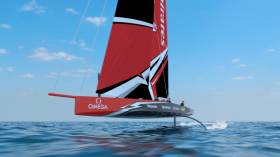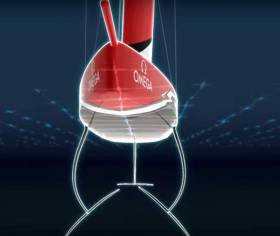Displaying items by tag: AC75
Emirates Team New Zealand Unveils new America's Cup Race Boat
Emirates Team New Zealand's new AC75 race boat has emerged from its building facility after an intensive 10-month programme. The America's Cup boat was wheeled out to prepare for its launch and commissioning phase in Auckland this month.
The team's COO, Kevin Shoebridge, said that it was a significant moment for any team when their race boat emerged from the shed and saw the light of day. He added that these moments were the most revealing of any campaign, giving an indication of the team's design path.
The boat was transported from the North Shore build facility to the Wynyard Point base under the cover of darkness, where an intensive fit-out program was undertaken. Shoebridge said that the team had the day on the calendar for a long time, and it was critical to hit these important milestones.
 Emirates Team New Zealand continues to commission and prepare the new AC75 for its naming ceremony next week Photo: Emirates Team New Zealand
Emirates Team New Zealand continues to commission and prepare the new AC75 for its naming ceremony next week Photo: Emirates Team New Zealand
The team is now preparing for the boat's naming ceremony next week. Shoebridge acknowledged the team's hard work, dedication, and commitment, but also noted that they still have a mountain to climb over the next seven months to defend the America's Cup in October successfully.
Despite the immense secrecy surrounding America's Cup campaigns, Shoebridge said that there comes a time when teams need to show some of their cards. While this boat's launch reveals only a portion of the team's designs, it indicates the team's design path and the boat's commissioning and the first sail will reveal more about the team's progress.
Meanwhile, the America’s Cup Barcelona 2024 will be launched in Ireland later this month by the Spanish Tourism Office with a special presentation in Dublin.
Double-Skinned Mainsail For New America’s Cup Design Has A Predecessor From A Century Ago
EuroSail News collects a number of recent stories revealing new details about the revolutionary AC75 foiling yacht design for the next America’s Cup.
Emirates Team New Zealand sail designer Burns Fallow tells Sail-World.com that the new boat’s two-skinned mainsail concept came out of a 20-minute brainstorming session held just a month after their win in the 35th America’s Cup in Bermuda.
Fallow is a long-time designer with North Sails and also one of the team who devised the AC75 class rule — and he faces a challenging two years years helping reconcile the monohull requirements with the new sail concept in a race boat that can defend the Auld Mug.
But the sail concept isn’t as newfangled as one might expect, with one L Francis Herreshoff filing a patent for a double-skinned mainsail on a rotating D-spar more than 90 years ago.
As previously reported on Afloat.ie, the AC75 heralds a new era for the America’s Cup, combining “extremely high-performance sailing and great match racing with the safety of a boat that can right itself in the event of a capsize”.
Meanwhile, planning for the 36th America’s Cup presented by Prada continues, with agreement reached recently to resolve a number of outstanding issues “in the best interest of the event” scheduled for March 2021.
“Every single day is already accounted for as we work and prepare for the 36th America’s Cup,” says Terry Hutchinson, skipper of American Magic — one of six challengers for the Auld Mug in Auckland.
America's Cup New Yacht Design: Fully Foiling AC75 Yacht Revealed (VIDEO)
An exciting new era in America's Cup racing has been unveiled today as the concept for the AC75, the class of boat to be sailed in the 36th America's Cup is released illustrating a bold and modern vision for high performance fully foiling monohull racing yachts.
The Emirates Team New Zealand and Luna Rossa design teams have spent the last four months evaluating a wide range of monohull concepts. Their goals have been to design a class that will be challenging and demanding to sail, rewarding the top level of skill for the crews; this concept could become the future of racing and even cruising monohulls beyond the America's Cup.
The AC75 combines extremely high-performance sailing and great match racing with the safety of a boat that can right itself in the event of a capsize. The ground-breaking concept is achieved through the use of twin canting T-foils, ballasted to provide righting-moment when sailing, and roll stability at low speed.
The normal sailing mode sees the leeward foil lowered to provide lift and enable foiling, with the windward foil raised out of the water to maximise the lever-arm of the ballast and reduce drag. In pre-starts and through manoeuvres, both foils can be lowered to provide extra lift and roll control, also useful in rougher sea conditions and providing a wider window for racing.
Although racing performance has been the cornerstone of the design, consideration has had to be focused on the more practical aspects of the boat in the shed and at the dock, where both foils are canted right under the hull in order to provide natural roll stability and to allow the yacht to fit into a standard marina berth.
An underlying principle has been to provide affordable and sustainable technology 'trickle down' to other sailing classes and yachts. Whilst recent America's Cup multihulls have benefitted from the power and control of rigid wing sails, there has been no transfer of this technology to the rigs of other sailing classes. In tandem with the innovations of the foiling system, Emirates Team New Zealand and Luna Rossa are investigating a number of possible innovations for the AC75's rig, with the requirement that the rig need not be craned in and out each day. This research work is ongoing as different concepts are evaluated, and details will be released with the AC75 Class Rule before March 31st, 2018.
The America's Cup is a match race and creating a class that will provide challenging match racing has been the goal from the start. The AC75 will foil-tack and foil-gybe with only small manoeuvring losses, and given the speed and the ease at which the boats can turn the classic pre-starts of the America's Cup are set to make an exciting comeback. Sail handling will also become important, with cross-overs to code zero sails in light wind conditions.
A huge number of ideas have been considered in the quest to define a class that will be extremely exciting to sail and provide great match racing, but the final decision was an easy one: the concept being announced was a clear winner, and both teams are eager to be introducing the AC75 for the 36th America's Cup in 2021.
The AC75 class rule will be published by March 31st 2018

























































